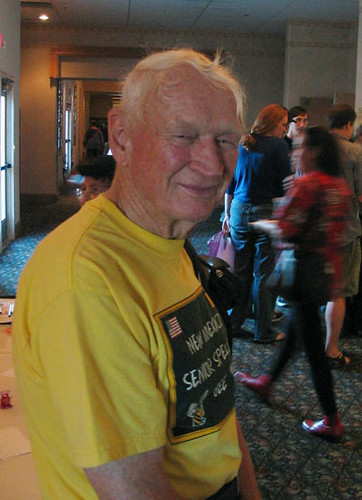
“First Fandom member and writer of the Fancylopedia Jack Speer passed away this morning [June 28],” writes Patricia Rogers.
Speer’s famous Fancyclopedia, published in 1944, formalized definitions for hundreds of terms in use by fans.
Prior to that, in 1939, he wrote the first history of science fiction fandom, called Up To Now. It was very hard to find copies until just last month when Robert Lichtman recreated it as a PDF edition and posted it at eFanzines. In this zine, Speer first articulated the idea of Numbered Fandoms (fannish historical epochs), which ever since has occupied many a fan’s idle hours.
Speer also innovated several indispensable bits of faanish typography, including the quasi-quote mark and the interlineation. He contributed to faanish cosmology by inventing FooFoo, the ghod of mimeography, fearsome foe of Ghu.
According to Don Fitch, Speer was diagnosed as terminal some weeks ago. Still, Jack had managed to attend Corflu Silver in April, making his way around with the aid of a portable oxygen supply, attentive to everything going on. The con’s classic moment was when fellow eo-fan Art Widner serenaded Jack with the first-ever filksong, written by Jack himself.
Although the term “filksong” had yet to be invented, several of these songs were sung at the 1940 Worldcon. Jack created them by setting new lyrics with a science fictional theme to familiar tunes. A snippet of one goes:
We’ll build a tempo-ship
And we’ll take a little trip,
And watch a million years go by.
In 1995, Speer received the First Fandom Hall of Fame Award. In 2004, he was Fan Guest of Honor at Noreascon 4. His collection, Fancestral Voices, was published by NESFA Press for the occasion.
Having spent decades thinking of Speer as a distinguished founding father of fandom, as he certainly was, I’ve tended to overlook that he was having a helluva lot of fun while making history. This point is brought home by Harry Warner’s anecdote about Speer at the 1947 Worldcon in All Our Yesterdays:
From time to time that Saturday night, the happy fans were vaguely aware of the existence of loud, intermittent noises. Several Philadelphians explained them away as a local phenomenon that occurred when sewer gas caused manhole lids to lift violently in a sort of municipal burping. However, the real facts were not at all like that. During a late drinking session…Speer had suddenly remembered the existence of fireworks in the hip pocket of the Quintessence of FooFoo, his current auto…. Several roman candles later, policemen in a squad car gave [Speer and other fans] a warning about discharging fireworks within the city limits… [Afterwards], Speer and Davis seem to have taken up strategic posts on upper fire escapes [of the con hotel]… Firecrackers and skyrockets were alternated to provide variety… When the police returned… they paid $5.00 apiece at the 21st District Station for disturbing the peace. The investment was at least partly justified because the pyrotechnics had helped Willy Ley find his way to the hotel.
A later e-mail from Patricia Rogers concluded with this request: “I talked with Ruth [Jack’s wife] for around an hour this evening. The memorial will probably be on July 8 or 9. She has asked me to speak about Jack and his role in SF/Fandom at the service. I know a fair amount but if you or anyone you can think of has anything they would like to add – I would be happy to – just let me know.”
